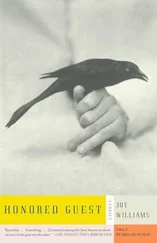“You’re nutty,” she says, putting down the food. Then she freezes, turns slowly around, gritting her teeth and staring ferociously. Race’s mouth flaps shut. He crouches, putting his muzzle between his paws, waving his haunches in the air. “Argggggghhhh,” Kate growls, ponderously raising her arms, curling her fingers into claws. “Brrrrrhharrr.” She stalks toward him, hung with sudden menace and ghastly intent, then shifts her direction slightly and begins to close in on him from the side. The dog’s eyes hang fast to the place where she had been but his flanks tense, his tail swings back and forth with a lazy delirium.
The child inches toward him, wheezing and babbling, and the dog’s brandy eyes flickered sly and eager now as he tried to keep her in his sight. He leaps, swiveling in mid-air, facing her directly again, his head cocked to one side, his hindquarters swinging artfully. He wraps his forepaws around her, panting and whimpering with delight, and Kate now rubs his head, digs softly at the bone above his eyes, the cartilaginous buckle of his beloved skull.
“What’s your opinion, Race? What do you say?” He sits politely before the dish as she mashes the meal and the canned meat together. Then he drops his head and nudges the food, trying to eat around the meal. Kate walks to the bulkhead steps. Race has a piece of meat bulging in his cheek and when he sees her leaving, he stops chewing. “You be a good boy now.” She waves. “I’ll see you in the morning.” He opens his mouth and the meat falls drearily into the dish. His gaze is hurt and accusing. He walks swiftly to the blanket and curls up upon it.
Kate circles the house and enters the front door. Once again, the stairwell to the second floor is before her. Her feet are wet. She has ruined her shoes. She hears someone moving about. A light goes on. It is a bare light bulb, hanging from the ceiling. It bounces a little from the pull that awakened it. Her cousin stands beneath it. She smiles up at him. While she is smiling, the bulb blows out with a slight whistle.
TWO COUSINS are sitting on a bed. The house is noisy and upstairs it is cold. The oldest is a boy and he is fourteen. The child is a girl, seven and one-quarter years old as she says, and her mother has just been buried a few hours before. The boy has very dark blue hair like someone in a comic book and is smoking a cigarette.
“I bet you’re not supposed to do that,” Kate says. “I bet your daddy would give you what for if he saw that.” She goes to her desk and takes out a small plastic basketball that splits in two. She opens it and brushes the ashes out of his hand where he has tapped them. “You’re smelling up my room but that’s all right. I like it. I don’t care.”
“You’re wet,” the boy says. “You’ve been running around with no coat and you’re going to get pneumonia.” After he says this, he wishes that he hadn’t. He does not want his little cousin, whom he is meeting for the first time, to think she is going to get sick and die. He is a nervous, worried boy, softly handsome. His parents run a small drugstore in the next state. It’s all they have. The entire family works there, the boy coming in after school. It is necessary that they like and respect their patrons, who steal lipstick and aspirin and knock over their Coca-Cola glasses. The boy is never allowed to do anything. He imagines himself far away, even now, in a foreign capital, in a night club. He’s read in old magazines that there are rooms of degenerate art in Europe, houses where evil and sexual things are displayed. He’d like to get into one of those rooms. Just once. But they were closed down, before he was born. He is dying to go to one of those rooms where songs by a man named Weill are played. At the same time, he realizes that his information is dated. He would do anything if someone could tell him where to find a room of degenerate art.
“I’ll never get pneumonia,” the girl says. “I’ll probably never ever get sick. There are some people who never get sick and others who never get well.”
The boy draws and draws on his cigarette until there is an ash almost two inches long. He dumps it into the plastic basketball. “Where’d you get this?”
“There was chocolate in it. Little chocolate basketballs wrapped in foil. I ate them all.”
“I’m sorry about your mother,” he says quickly. “It’s very sad and I’m sorry.”
The child scratches her throat and looks out the window. “Well,” she says, “you certainly didn’t have anything to do with it. You don’t even live around here.” She wonders how long people will be talking about this. She sighs.
“No,” he says, surprised.
“Your hair is beautiful. I wish I had blue hair. It’s the color that a storm is, did you know that?”
“I wash it a lot,” the boy says. The child is sitting on the edge of the bed, her bare legs swinging beneath her short dark dress. She swings them faster and faster. The hem of the dress is wet and wrinkled.
“Well, it’s very nice. It’s unusual.” The child enjoys being here with her cousin. She is glad that everyone is downstairs and that no one knows where she is or is bothering her. She likes having him sit on her bed, smoking and looking around at all her things. When her father comes up, perhaps they will all have a cup of cocoa together. She wants to be a good conversationalist. “Do you ski?” she asks politely.
“I ski pretty well.” The child’s face is provocative and he feels harried. He feels that something is being expected of him. He lights another cigarette.
“I have a sled,” the child says vaguely, “but I have never skied. Daddy doesn’t ski.”
The boy is perplexed. He tries to keep himself very still but it is as though he has something live and hasty buttoned up within his clothes. He wonders if he will get meningitis or cancer or become deranged because of his thoughts and his constant manipulation of himself.
“I want to show you something,” the child says. “I want to show you my things.” She goes to her desk and removes an entire drawer, setting it between them on the bed.
“Look. I have seventy-six wilderness cards from Shredded Wheat. All different. I have a hundred Dixie-cup tops with the pictures of movie stars. All different. I have the pictures of eight football players that can only be seen through a special red magnifying glass. Four of them are members of the Crimson Tide, a name which I think is very pretty. The Crimson Tide is all I care about. I’d give the other four cards away.”
In the upper corner of one of the Wilderness cards is a deer. On the bottom is an Indian. When one is moving through unknown country , the card instructs, it is wise to make small signs which will guide you back yet which will not inform possible enemies of your presence. Break the branch of a certain tree. Move a rock slightly so that moss will be visible. Make marks in streams. Beware of marked paths .
There were flowers and dirt in an envelope, a bridle bit, a photo of his uncle, her father, as a young man, cut out precisely, like a paper doll. There was a piece of flannel shirt, a magnetic plastic lady in a bathtub. It was a new currency, giving access to a ruined land. There was a cast-iron colt, his hoof broken off.
“You can’t fix them,” the child sighs. “It’s gone forever. It’s like a real horse when he breaks his leg.” She picks up a common pin. “This is supposed to be lucky. I found it honestly, on the ground. Lots of people pick up pins in department stores where they’re all over the place. They go into dressing rooms where there are hundreds of pins. If you believe in pins I’ll give it to you and it will probably bring you luck. It can’t bring me luck because I don’t believe in it. Believing in pins would mix up the whole religion.”
Читать дальше












